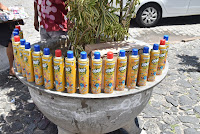In 1549, Portuguese explorers established Salvador as the first capital of colonial Brazil. It became the centre of sugar cane production, using slave labour, and the main slave trading port. Over 5 million slaves were transported from Africa to Brazil during the 19th century. The Afro-Brazilian culture strongly influences the religion, cuisine, music, and art today.
From the terminal, we walked to the
Elevador Lacerda, which took us to
Pelourinho, the historical centre of the city.


It is Carnival here as well. Although too early in the day for parades, there are signs of what is to come everywhere.
Salvador has over 165 churches as well as the largest assortment of Baroque architecture in Latin America.
 |
| Church of Our Lord of Bonfim |
Back at the lower level, our final stop was the African Market full of stalls selling fabric art, crafts and souvenirs. The temperature was 28 C (82 F) and the humidiy was high. We found cold beer to enjoy while listening to Afro Brazilian fusion music.






No comments:
Post a Comment